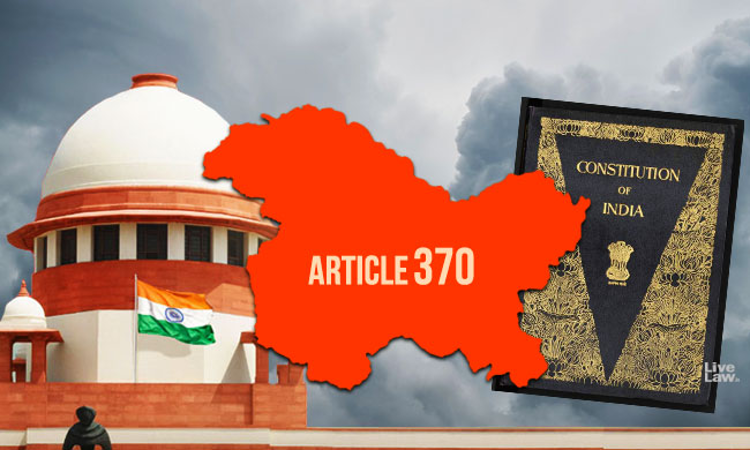Jammu & Kashmir : As Uncertainty And Fear Looms Large, The Idea Of Justice Remains Elusive
P V Dinesh
17 Sept 2019 10:05 AM IST

According to Article 144 of the Indian Constitution, "All authorities, civil and judicial, in the territory of India shall act in aid of the Supreme Court." Despite the constitutional imperative being so, a person who has been observing the Supreme Court proceedings on the challenges mounted against the clampdown after 5th of August in Kashmir, might comprehend Article 144 conversely - Does the Supreme Court act in aid of executive authorities ?
On 16thSeptember, 43 days after the clampdown, the Supreme Court has passed a cautious order in one of the petitions seeking liberty. It was observed:
"…….The State of Jammu & Kashmir, keeping in mind the national interest and internal security, shall make all endeavours to ensure that normal life is restored in Kashmir; people have access to healthcare facilities and schools, colleges and other educational institutions and public transport functions and operates normally. All forms of communication, subject to overriding consideration of national security, shall be normalized, if required on a selective basis, particularly for healthcare facilities."
As a marked departure from specific orders like, granting transit and visiting rights to its citizens to their own homes and parents in Kashmir, the order cited above can be treated an order in rem. The enabling words such as "keeping in mind the national interest and internal security" and "overriding consideration of national security",used in the order may always work as a cover for the executive to advance with its plan on Kashmir.Whatever be the outcome, the Government of the day, can always be proud of its legal moves. Till now, it has not faced any major constitutional obstacle in the court, though arguments on Articles 19 and 21 are being raised.
Another interesting turn of development is the 'reminder' from the Court on the existence of a High Court in Jammu and Kashmir. "Why not High Court?" is the first question that is invariably asked whenever a writ petition is filed directly in the Supreme Court. And it may be a coincidence - but a glaring one indeed – that the judicial perspective on restoring normal life in Kashmir coincides with the executive relaxation of clampdown in the area and the Supreme Court inquires to petitioners as to why they have not approached the High Court in the first place.
On the counsels' mentioning about the state of incommunicado as a result of mobile shutdown, the court was eager to know how the shutdown happened. Court did ask about the private operators not approaching the High Court, a cue they should seriously consider. Similarly, the statement of a senior counsel about custody of juveniles and difficulties in accessing the High Court for justice seemed to apparently shock the CJI. Overcome with dismay, he has called for a report from the Chief Justice of the High Court forthwith. It is important to know the nature of detention in those cases - whether it is preventive detention or an arrest. The information is crucial as to estimate the applicability of Art.22 in such cases. Apart from CJI, nation also wanted to know from the Chief Justice of High Court of J&K about any situation where there is denial of rights.
It is an irony that the executive, to make applicable the Constitution of India in its entirety to Jammu Kashmir, has made it applicable without its heart, namely the fundamental rights. As reported earlier in the media, the orders passed by the J&K High Court since the lockdown of the region, are mostly in the nature of 'mere adjournments'. The curfew has kept the litigants, lawyers and other stake holders away from accessing justice.
The inability of free movement and lack of communication has crippled the lawyers in carrying out their profession. With many lawyers being detained for speaking out, including the President of Bar Association of Kashmir, Mr. Abdul Qayoom, who is presently at lodged at Agra jail, an atmosphere of fear exists everywhere.
Not all the detenus have been able to challenge their detentions in the courts. Even if the kith and kin of the detenus are able to approach lawyers for help, there is the perception of a threat which prohibits lawyers from accepting the Habeas Corpus briefs. Since Habeas Corpus petitions are directly against the brooding 'State Power', the lawyers are afraid and they do not want to be profiled as 'anti- India'. 'A practical lawyer' wants to be insulated from such associations.
Since lawyers are profiled on the basis of the briefs they accept, which practically disqualifies them from holding any position of significance or even elevation to the bench, keeping a safe distance from 'uncomfortable cases' is the safest practice. This deterrence by fear has crept in the minds of the lawyers.
On the contrary, the impecunious lawyers face a larger issue of day to day survival. Majority of the lawyers, including juniors are on a month to month existence based on income from small professional engagements. The curfew has affected their very existence forcing them to migrate in search of work.
Another set of affected people are mostly the unacknowledged persons who live on the margins of the legal profession. The stamp vendors, petition writers, typists, clerks, office helpers, photocopiers, translators, drivers and many similar faceless daily wagers are on the verge of poverty. As uncertainty and fear looms large, the idea of justice sounds hollow and the hope of a livelihood remains elusive.
(P V Dinesh is an advocate practising at the Supreme Court)


